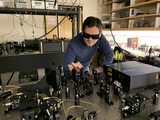PhD Student Cory Nunn detects zero photons!
Remarkable new technologies have allowed quantum physicists to “zoom-in”, study, and control some of the tiniest things in the universe — things like individual atoms, electrons, and photons. Photons, for example, are so “small” that an ordinary household lightbulb emits one hundred thousand million billion (ie. 10^20) of them every second! Yet advances in optical technology have led to the development of exquisitely sensitive detectors that can identify the presence of just one tiny photon. Indeed, the ability to detect exactly one single photon at a time has led to a number of recent advances in quantum computing, quantum communication, and quantum sensing.
In a series of two recent papers [1,2], UMBC Physics PhD candidate Cory Nunn has extended this idea to show that - counterintuitively - the ability to detect exactly zero photons is also significant. His experimental research involves processes called “Heralding on Zero (HoZ)” and “Zero-Photon Subtraction (ZPS)” that not only have fundamental implications in quantum mechanics, but also offer practical advantages in quantum communication and quantum entanglement distribution. “It turns out that even when we measure 'nothing,' that information can still help us manipulate quantum light in all sorts of applications”, says Nunn.
[1] Cory M. Nunn, James D. Franson, and Todd B. Pittman, “Heralding on the detection of zero photons”, Phys. Rev. A. 104, 033717 (2021).
[2] Cory M. Nunn, James D. Franson, and Todd B. Pittman, “Modifying quantum optical states by Zero-Photon subtraction”, Phys. Rev. A. 105, 033702 (2022).
Figure caption: UMBC PhD student Cory Nunn detecting zero photons in the Quantum Information Laboratory.
In a series of two recent papers [1,2], UMBC Physics PhD candidate Cory Nunn has extended this idea to show that - counterintuitively - the ability to detect exactly zero photons is also significant. His experimental research involves processes called “Heralding on Zero (HoZ)” and “Zero-Photon Subtraction (ZPS)” that not only have fundamental implications in quantum mechanics, but also offer practical advantages in quantum communication and quantum entanglement distribution. “It turns out that even when we measure 'nothing,' that information can still help us manipulate quantum light in all sorts of applications”, says Nunn.
[1] Cory M. Nunn, James D. Franson, and Todd B. Pittman, “Heralding on the detection of zero photons”, Phys. Rev. A. 104, 033717 (2021).
[2] Cory M. Nunn, James D. Franson, and Todd B. Pittman, “Modifying quantum optical states by Zero-Photon subtraction”, Phys. Rev. A. 105, 033702 (2022).
Figure caption: UMBC PhD student Cory Nunn detecting zero photons in the Quantum Information Laboratory.
Posted: March 8, 2022, 8:54 AM
